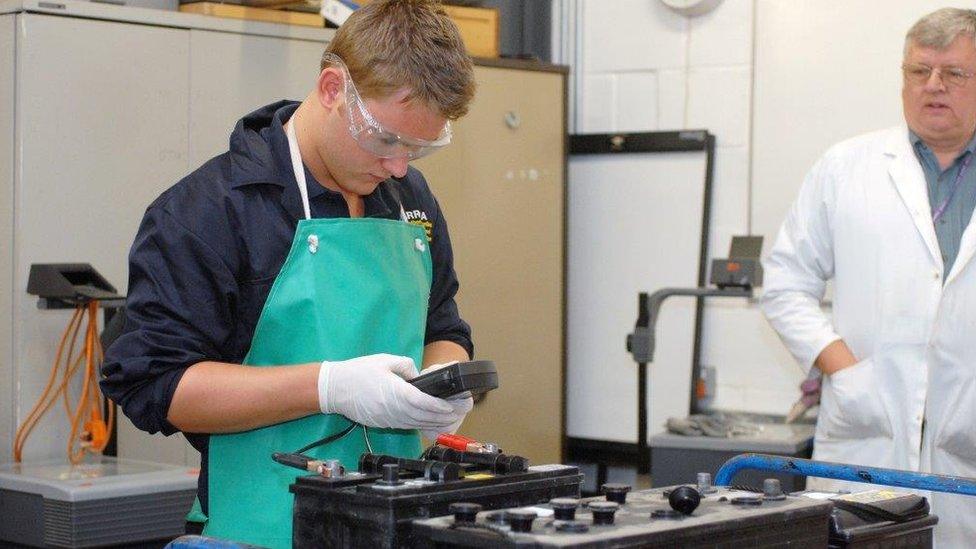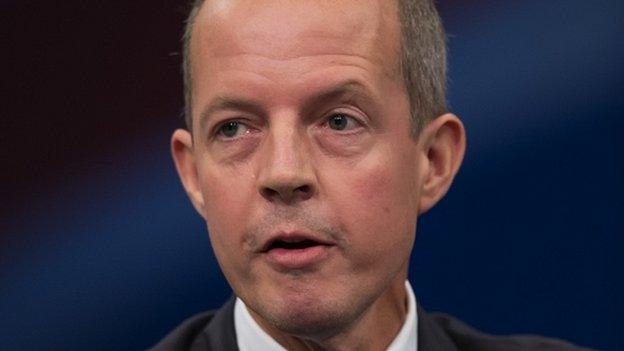Further education 'funding crisis' warning
- Published

There are forecasts that 70 colleges will be rated as "financially inadequate" this year
Further education colleges in England face a "looming crisis" in funding, warns a committee of MPs.
A Public Accounts Committee report calls for more rapid intervention when colleges face financial difficulties.
Committee chairwoman Meg Hillier said the government had been "desperately slow off the mark".
But Skills Minister Nick Boles said the government had protected funding for further education and colleges would be more financially resilient in future.
The Department for Business, Innovation and Skills says its total spending on further education will be £3.41bn by 2019-20, up by 36% on current spending.
'Financially inadequate'
The report from the Public Accounts Committee, which scrutinises public spending, warns that the financial state of the further education sector remains "deeply worrying".
The committee has previously warned of the risk of "financial meltdown", with forecasts that 70 colleges would be rated as "financially inadequate" by the end of this academic year.

Nick Boles says BIS funding for further education will increase
The report says that further education colleges can give people the skills and training which can "transform their life prospects", but too many colleges are struggling financially.
Financial worries have meant that colleges were cancelling courses, not hiring staff and postponing investment plans, says the report.
"There is a real danger of substantial further deterioration in the sector and government must act now to ensure FE is put on a stable financial footing," said Ms Hillier.
The report raises concerns about "confusion" over who is responsible, when funding is split between different departments and funding agencies.
'Fix-all' approach
There are 4 million students in the further education sector, with £7bn per year of public funding from the Department for Education and the Department for Business, Innovation and Skills.
The report calls for more clarity over who will take charge of oversight and intervention if a college is in financial difficulties.

There have been calls for more clarity over who should intervene in financial problems
The government has commissioned "area-based reviews" to evaluate local services for the post-16 age group.
But the report warns against seeing these reviews as a "fix-all" approach, as it "not clear how they will deliver a robust and financially sustainable sector".
"There is no doubt further education is under significant pressure and it is both frustrating and sad to think of the potential going unfulfilled - particularly in cases where earlier intervention could have prevented problems from escalating," said Ms Hillier.
Martin Doel, chief executive of the Association of Colleges, said last month's Spending Review had a "better-than-feared outcome" for further education, but there were still "significant financial pressures".
"The committee has recognised the damage funding cuts have already done to colleges across England," said Mr Doel.
Neil Carmichael, chairman of the Education Select Committee, said the economy needed a "thriving, innovative further education sector to help equip people with skills and qualifications".
But he said funding "has to match the government's ambitious goals for the further education sector and ensure colleges have the financial security to plan ahead and achieve these aims".
More apprentices
Jonathan Tummons, an expert in work-based learning, at Durham University, said: "Further education has been underfunded - in comparison to schools and sixth forms - for many years.
"Already there are too many instances of students being pushed together in order to make a class financially viable, or of students being pushed on to courses that they are not yet ready for," said Dr Tummons.
Gordon Marsden, Labour's shadow minister for universities, further education and skills, said: "This authoritative cross-party report raises a red light danger signal about the future of our further education colleges and providers, and confirms the damage this government has done to further education."
"Labour has consistently warned that such a short-sighted approach to further education risks worsening the skills emergency that businesses and industry are facing; at the same time falling investment in sixth forms and further education has already put colleges up and down the country under strain, with more real terms cuts to come."
The government says it has supported a range of measures to promote skills and training, including increased spending on apprenticeships, protecting core adult skills budgets, extending tuition fee loans to further education and creating five new national colleges.
"We have protected funding for further education and will be increasing real-term spending by more than a third in the next five years, furthermore funding for apprenticeships will have doubled since 2010," said Mr Boles.
"We recognise the important contribution the sector makes to increasing opportunity for young people and businesses, and ensuring our long-term economic security.
"With early intervention from the funding agencies, the FE commissioner and locally-led area reviews, colleges will become more efficient and financially resilient while ensuring the best return on investment for public funding."
- Published20 July 2015

- Published10 November 2015
